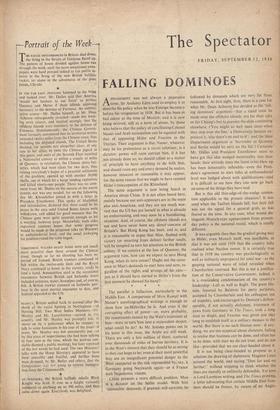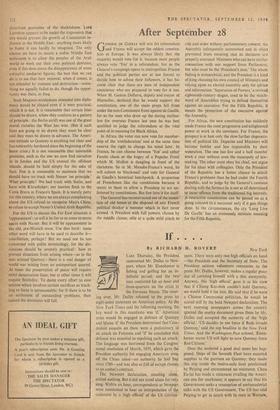FALLING DOMINOES
APPEASEMENT was not always a pejorative term; Sir Anthony Eden ,used to employ it to describe his policy when he was Foreign Secretary before his resignation in 1938: But it has been in bad ,odour at the time of Munich; and it is now being revived, still as a term of abuse, by those who believe .that the policy of conciliating Colonel Nasser and Arab nationalism can be equated with that of appeasing Hitler and Fascism in the Thirties. Their argument is that. Nasser, whatever may be his pretensions as a social reformer, is a dictator; power will soon corrupt -him, if it has not already done so; we should refuse as a matter of principle to have anything to do with him, and should resist any and every demand he makes, however innocent or reasonable it may appear, for the same reason that Ave ought to have resisted Hitler's reoccupation of the Rhineland.
The same argument is now being heard in America about China. It is not often heard here, mainly because our, anti-appeasers are in the main also anti-American, and they are not much wor- ried that the US has put herself in what is already an embarrassing, and may soon be a humiliating, situation. And, of course, the offshore islands are not and have never been any direct^ concern of Britain's. But Hong Kong has been, and is; and it is reasonable to argue that Mao, flushed with victory (or smarting from defeat) farther south, will be tempted to turn his attention to the British colony. If we connive at the loss of Quemoy, the argument runs, how can we expect to. save Hong Kong, when its turn comes? Ought not the resist- ance to Mao's demands to start here and now, re- gardless of the rights and wrongs, of his case— just as it should have started to Hitler's from the first moment he shbwed his hand?
The parallel is fallacious, particularly in the Middle East. A comparison of Mein Kampf with Nasser's autobiographical writings is enough to show how un-Hitlerlike he is. And even if the corrupting effect of power—or, more probably, the resentments caused by the West's treatment of him—were to turns'him into a malevolent despot, what could he do? As Mr. lonides points out in his letter in this issue, the Arabs are still weak. There are only a few million of them, scattered over thousands of miles of barren territory. It is in the West's interest that they should be as strong as they can hope to be; even at their most powerful they are an insignificant potential danger to the West compared to the risk represented by say, a Germany going Naziwards again—or a France with Napoleonic visions, China presents a more difficult problem. Mao is a dictator on the Stalin model. With him 'reasonable' demands, if granted; will cert:inly be followed by demands which are very far from reasonable. At first sight, then, there is a case for what Mr. Dean Acheson has derided as the 'fall- ing dominoes' argument—that a stand must be made over the offshore islands, not for their sake or for Chiang's but to prevent the slide continuing elsewhere. ('You might as well meet them when they step over the line,' a Democratic Senator ex- pressed it, .'else there's no end to it': and the State Department argument is 'Surrender at Quemoy and Berlin would be next on the list.') Certainly Mr. Dulles and President Eisenhower seem to have got this idea wedged inextricably into their heads; their attitude since the latest crisis blew up has been lamentably inflexible—even the Presi- dent's agreement to start talks at ambassadorial level was hedged about with qualifications—and it is 'difficult to see how' they 'can now go back on some of the things they have said.
But is this old thin-edge-of-the-wedge conten- tion applicable to the present situation'? It was used when the Tachen Islands fell; but their fall was not the signal for a general grab, as was feared at the time. In any case, what would dis- tinguish Munich-type appeasement from present- day policy is the national mood, which is totally different.
It was arguable then that the gradual giving way to Hitler, even Munich itself, was justifiable, in that It was not until 1939 that the country fully realised what Nazism meant. It is certainly true that in 1938 the country was psychologically as well as militarily unprepared for total war—as the gasping national wave of relief revealed when Chamberlain returned. But this is not a justifica- tion of the Conservative Government; indeed, it is a -resounding condemnation, of the country's leadership—Left as well as Right. The great illu- sion, fostered by Baldwin for party purposes, accepted by Chamberlain and his colleagues out of stupidity, and encouraged by Dawson's 'dishon- ourable, if not actually dishonest, treatment of news from Germany in The Times, took a long time to dispel, and Fascism was given just that long to establish itself as a military menace to the world. But there is no such illusion now : if any- thing, we are too sceptical about dictators, failing to realise that business can be done, and often has to be done, with men we do not trust, and do not like—provided that we are clear-headed about it.
It is not being clear-headed to propose as a solution the drawing of diplomatic Maginot Lines around the world, and saying 'Thus' far and no farther !' without stopping to think whether the lines are morally or militarily defensible. Yet here is Lord Lambton writing, and The Times printing, a letter advocating that certain Middle East fron- tiers should be frozen, by means of an Anglo- American guarantee of the sheikhdoms. Lord Lambton appears to be under the impression that this would prevent the growth of Communist in- fluence in the Middle East : anything more likely to foster it can hardly be imagined. The only chance we have to secure a stable Middle East settlement is to allow the peoples of the Arab world to work out their own political destinies, even if this does mean the disappearance of some colourful medieval figures; the best that we can do is to see that their removal, when it comes, is, not attended by violence and destruction—some- thing we signally failed to do, though the oppor- tunity was there, in Iraq.
Such Maginot-mindedness extended into diplo- macy would be absurd even if it were practical, which it is not. It is reasonable that certain lines should be drawn, where they conform to a pattern of principle : the Berlin airlift was one of the great moral victories the West has won. (But if such lines are going to be drawn they must be clear and they must be drawn in advance. The Ameri- can attitude to Quemoy is anything but clear and has noticeably hardened since the beginning of the latest crisis.) It is not reasonable that untenable positions, such as the one we now find ourselves in in Jordan and the US around the offshore islands, should be held simply for the sake of face. Nor is it reasonable to maintain that we should have no truck with Nasser 'on principle.' What principle? We had truck with Stalin, and have with Khrushchev; our tourists flock to the Costa Brava in Franco's Spain. It is merely petty for this country, where we are always complaining about the US refusal to recognise Mao's China, to refuse to accept Nasser's United Arab Republic.
For the US to discuss the Far East situation is 'appeasement'; so will it be for us to come to terms again with Nasser. But it will be appeasement in the old, pre-Munich sense. Use dies hard: some other word will have to be used to describe it— conciliation, perhaps? But we need not be too concerned with polite terminology, for the dis- cussions should be severely practical: how to prevent situations from arising where—as in the seas around Quemoy—there is a real danger of world war arising from an unimportant quarrel. At times the preservation of peace will require strict demarcation lines; but at other times it will require flexibility. To damn every effort to ease tension which involves certain sacrifices as truck- ling to force is unreasonable; for if there is to be no settlement of outstanding problems, then indeed the dominoes will fall. •



































 Previous page
Previous page